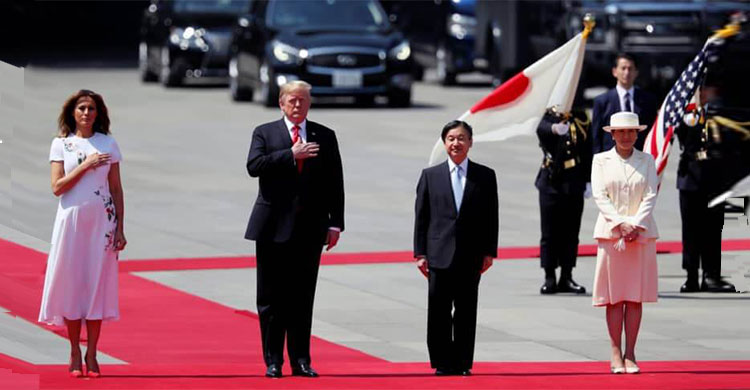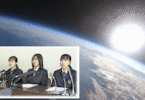Hello Ladies & Gentlemen how are you? Today’s topic is just now visiting U.S.President Donald Trump and Mrs.Malania Trump.
As you know, on second day of a 4-day state visit to Japan, President Trump enjoyed golfing with his buddy Japanese Premier Shinzo Abe, while The U.S.first lady, Malania took part in a digital art session with Japanese students togethr with Japanese Prime Minister Abe’s wife, Mrs. Akie Abe.
After that, President and his wife, Prime Minister and his wife, 4 of them enjoyed watching a traditional Japanese national sport “Sumo” (Further information on Sumo, click here), and traditional charcoal grill dinner at upscale restaurant.
Under a blazing hot sun at Japan’s Imperial Palace, U.S. President Donald Trump on Monday became the first world leader to meet the new emperor of Japan.
The president, who is on a four-day state visit, was the center of attention at a grand outdoor welcome ceremony where they took a walk down red carpets, reviewing Japanese troops as the guest of honor.
Trump’s “state call” opened with handshakes and greetings from Naruhito, who ascended to the throne on May 1, and his wife, Empress Masako.
As he approached the emperor, Trump said, “How are you? Thank you very much.” The first lady told the empress, “Nice to meet you.”
After exchanging pleasantries inside the palace, the couples emerged and walked to a raised platform as the national anthems of both countries were played.
Trump showed little emotion, but waved near schoolchildren feverishly waving U.S. and Japanese flags. Some of the children suffered from the heat and were later seen siting with cups of water and cool compresses on their foreheads.
Contents
What’s the state visit and Who curried favor with him?
It’s not the emperor who chose Trump as his first state guest. It was Abe, who is seen by some as using the invitation to meet Naruhito to curry favor with Trump who is threatening to impose potentially devastating tariffs on Japan’s auto industry, among other tensions in the relationship.
At the White House last week, Trump noted the significance of his meeting with the emperor. Naruhito took the throne after his father stepped down, the first abdication in Japan’s royal family in about two centuries.
“It’s a very big thing going on with the emperor. It’s something that hasn’t happened in over 200 years,” Trump said. “I am the guest, meaning the United States is the guest.”
Trump stressed that Abe “very specifically” said Trump is the guest of honor.
“With all the countries of the world, I’m the guest of honor at the biggest event that they’ve had in over 200 years,” Trump said.
After leaving the Imperial Palace, Trump went to the Akasaka Palace, the state guest house with lush manicured grounds, for meetings, a working lunch and joint news conference with Abe.

Emperor Naruhito talks with U.S. President Donald Trump while first lady Melania Trump chats with Empress Masako at the Imperial Palace in Tokyo on May 27.
The language barrier fell away Monday when Emperor Naruhito and Empress Masako greeted U.S. President Donald Trump and first lady Melania Trump in English at the Imperial Palace, in what could be a taste of things to come for the most internationally minded imperial couple in Japan’s history.
The emperor and empress greeted the president and first lady with warm smiles upon their arrival at the palace. The party shook hands and then continued inside, where the imperial couple introduced their guests to other members of the imperial family.
Afterward, the imperial couple met with the president and first lady for further discussion. In the past, such meetings have been used to discuss the state of each nation.
The emperor is a graduate of Oxford University with experience traveling in Europe, and the empress, a graduate of Harvard, is a former diplomat and a polyglot fluent in English and French.
The arrival of a multilingual imperial couple is seen by observers as representing a decisive shift in the Japanese monarchy and its relationship with other nations.
On Monday, the emperor and empress acted as translators for Trump and the first lady as they spoke to a seemingly endless line of politicians, ambassadors and other guests.
Professional interpreters — who were presumably hired for the occasion — could only watch while the imperial couple handled themselves with poise while navigating countless introductions and interactions throughout the affair.
Trump’s meeting with the imperial couple was followed by a summit with Abe. In the evening, a banquet at the Imperial Palace was set to be attended by roughly 170 guests including members of the imperial family and several Cabinet ministers, among others.
Imperial banquet at the palace hosted by the emperor
The president also will be the guest of honor at an imperial banquet at the palace hosted by the emperor.

Emperor Naruhito is seated along with U.S. President Donald Trump at a banquet held in the Homeiden hall of the Imperial Palace in Tokyo on May 27. Empress Masako is seated left and First Lady Melania is seated right.
Emperor Naruhito and Empress Masako hosted a banquet at the Imperial Palace to honor visiting U.S. President Donald Trump and his wife Melania.
Scholars scrutinizing Naruhito’s welcoming remarks were struck by how close he stuck to phrases that had been uttered by his father, Emperor Emeritus Akihito.
In his address, Naruhito said: “Our two countries have overcome various challenges and have fostered mutual understanding and trust. Today, we are connected by the strong ties of friendship as two extremely close neighboring countries spanning the Pacific.”
He also noted that his father and mother, Empress Emerita Michiko, repeatedly paid their respects at memorials dedicated to those who lost their lives during World War II.
“I sincerely hope that the peoples of our two countries will continue to contribute to peace and prosperity in the world,” he said.
Naruhito also referred to fond memories of his first extended visit to the United States in 1985, noting that he was warmly welcomed by President Ronald Reagan.
He also mentioned that Masako spent her childhood in New York and attended high school and college in the Boston area.
“We both feel a sense of nostalgia and distinct closeness to your country,” the emperor said.
Trump responded by speaking about the “cherished bond” between the two countries, which he pledged to protect, noting that bilateral ties had been fostered carefully over decades.
The banquet attended by 165 guests was held in the Homeiden hall and featured French cuisine with white and red wines, according to the Imperial Household Agency.
U.S. officials also arranged for cola to be served to the president.
The highlight of the dinner was a Mount Fuji-shaped ice cream standing 20 centimeters high. The base was made from “matcha” ice cream using powdered green matcha tea for flavor.
The special ice cream has featured at imperial banquets since the Meiji Era (1868-1912).
With Trump ’s Visit to Japan, Empress Masako Finds a Spotlight
Empress Masako and President Donald Trump toast during a state banquet at the Imperial Palace in Tokyo.
Supporters of Masako, a multilingual former diplomat, see a chance for her to come into her own after spending years trapped by her role as the wife of a future emperor.
On Sunday night, men in loincloths and samurai topknots stole the limelight from the president of the United States. On Monday, the new empress of Japan was the star.
When the new Japanese emperor, Naruhito, and his wife, Masako, welcomed President Donald Trump and the first lady, Melania Trump, to the palace Monday morning during their four-day state visit, Masako, a multilingual former diplomat and Harvard graduate, became an instant hit on social media.
The Japanese public marveled as she spoke fluently in English to Melania Trump–even though the emperor also spoke English to Donald Trump until an official urged him to introduce his interpreter.
“Masako sama can speak five languages,” one Twitter user wrote in a widely shared post, using an honorific term of address. “She is awesome and cool. I admire her. I hope she will demonstrate her ability more and more.”
And the image of Masako chatting with Donald Trump suggested to some that she will be able to use her diplomatic skills to help advance Japan’s soft power and perhaps even stake out a new role for women in the deeply patriarchal imperial family.
“The shining smile of Masako sama is gleaming!” wrote one Twitter user. “Brilliant! She’s such a brilliant person. Ah, I really think that Masako sama’s stage is here! Diplomacy!”
Many Japanese, but especially women, saw the international debut of Masako, 55, who has been married to Naruhito for 26 years, as a chance–finally–for her to use her training and experience after spending years trapped in her role as the woman whose primary mission was to produce an heir to the throne.
“I think she is going to be coming into her own,” said Mihoko Suzuki, director of the Center for the Humanities at the University of Miami, who has written about women in monarchies.
But the empress faces many obstacles in defining her own role in Japanese public life because strict codes dictate what she can and cannot do.
Under the Imperial Household Law, which governs most matters of protocol related to Japan’s monarchy, Masako was not even permitted to attend the sacred ascension ceremony for her husband this month. Women are not allowed to sit on the throne.
“The Japanese public is so excited and it seems like they are very much expecting Masako to take advantage of her previous career as a diplomat,” said Kumiko Nemoto, a professor of sociology at Kyoto University of Foreign Studies. “I’m sure she understands that there are lots of forces she needs to take account of and not overstep certain boundaries.”
Because the Imperial Household Agency, which manages the imperial family’s every move, is one of the most traditional institutions in Japan and is dominated by mostly older Japanese men, “they expect Masako the empress to behave with always a certain smile and a very subservient type of womanhood,” Nemoto said.
Monday’s banquet was not Masako’s first time sitting next to a U.S. president. Just a month after her wedding in 1993, the public swooned when she sat between President Bill Clinton and President Boris Yeltsin of Russia at a state dinner in Tokyo and conversed easily with both in their own languages.
But before long, the Japanese news media became consumed by one question: when Masako would have a child.
Even after her daughter, Princess Aiko, was born in 2001, the Imperial Household Agency prohibited Masako from traveling abroad in case that would interfere with her ability to get pregnant again, prompting her to sink into depression and withdraw from public appearances altogether.
At a 2004 news conference, Naruhito, who was then the crown prince, implicitly criticized the palace agency for placing so many restrictions on his wife.
“I think it would be better if Princess Masako could go out with a little more freedom and be able to do a variety of things,” he said.
As empress, Masako is likely to travel more freely. Her mother-in-law, Michiko, rarely left the side of Naruhito’s father, Akihito, who abdicated the throne at the end of April in 2019.
Some analysts say Masako could carve out an independent role by championing causes she cares about rather than simply accompanying the emperor everywhere.
“Now the role of women is more independent,” said Mari Miura, a professor of political science at Sophia University in Tokyo. “Women have separate jobs from wives and mothers, so why shouldn’t Masako do that?”
But in addition to the constraints of the monarchy, Masako also faces the same social pressures as her fellow countrywomen.
“It’s desirable that women’s advancement in society is making progress,” Lully Miura, a political scientist who runs the Yamaneko Research Institute, wrote in an essay in the June edition of Bungei Shunju, a monthly magazine.
“But women still take on a large part of delivering and raising children,” she added. “So dependable women tend to play the roles of wife and mother perfectly.”
The emperor has been open about his wife’s struggles with depression and has said that her ability to perform her public duties could be affected by her mental health.
With her first appearance as empress, the Japanese news media has seized on Masako’s apparent sunny disposition and declared that she appears much happier than she has in years.
It is an alluring narrative, analysts say, but the situation is not so simple.
“People do sympathize with her and they very much want her to be the Japanese princess who has the successful happy ending after all the trials she went through,” said Kathryn Tanaka, an associate professor of cultural and historical studies at Otemae University in Nishinomiya.
“Everyone is cheering for her and rooting for her and wanting her to have this kind of happy ending. It may be something where the public has to accept what she’s able to do.”
Finally, I have another blog about “Welcome New Era “Reiwa” And New Emperor & Empress” to be well worth browsing.











Leave a Comment